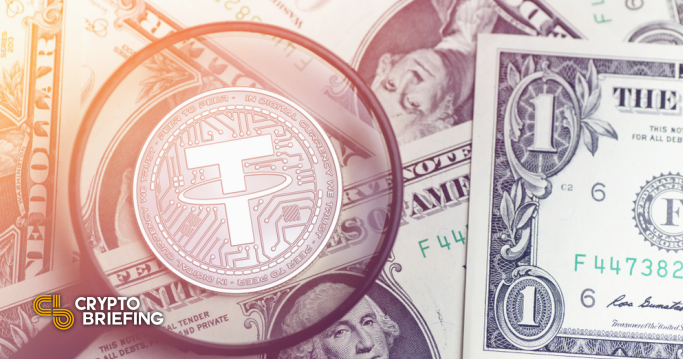Latest Tether Report Says USDT Is 10% Backed by Cash
The top stablecoin company has published a new assurance report.

Key Takeaways
- Tether has published a new assurance report detailing the composition of its financial reserves.
- Those numbers suggest that USDT is backed by more than 50% cash equivalents, including 10% cash and bank deposits.
- The report was conducted by the auditing firm Moore Cayman.
Share this article
Stablecoin company Tether has published a new assurance report detailing the composition of funds backing its USDT stablecoin.
USDT Is 10% Backed by Cash
Tether’s USDT token is backed by the U.S. dollar, meaning that the stablecoin firm must keep a reserve of funds in its possession equivalent to the value of USDT tokens in circulation.
However, the firm has been criticized due to the fact that it backs the token with financial assets other than actual U.S. dollars.
This week’s report gives a breakdown of Tether’s current reserves. It says the company has $62.8 billion in assets. Roughly $6.3 billion of those assets are actual cash and bank deposits. That means the USDT token is 10% backed by cash by any definition.
That figure (10%) is a significant increase from Tether’s May assurance report, which indicated that 3% of assets were cash.
This week’s report also indicates that USDT is backed by substantial cash equivalents, including commercial papers, certificates of deposit, reverse repurchase notes, and treasury bills. Those assets, excluding the above cash and bank deposits, amount to $47.1 billion—making up well over half of Tether’s total assets.
Tether’s remaining assets include secure loans ($2.5 billion), corporate bonds, funds, and precious metals ($4.8 billion), and other investments including digital tokens ($2.0 billion).
Tether Attracts Criticism
Tether has historically attracted criticism for failing to provide audits of its cash holdings. It is not clear whether this report will satisfy critics, as it is an assurance opinion rather than a proper audit.
Unlike other cryptocurrencies, a fully independent audit of Tether may not be possible. Transactions involving USDT can be tracked on the public ledgers of various blockchains, but it is impossible to manually verify each token’s backing manually due to the fact Tether’s collateral exists in private accounts.
The report published this week was created by Moore Cayman, a Cayman Islands-based auditing and assurance firm.
Disclaimer: At the time of writing this author held less than $75 of Bitcoin, Ethereum, and altcoins.
Note: This article was edited to adjust Tether’s cash equivalent balances.
Share this article
